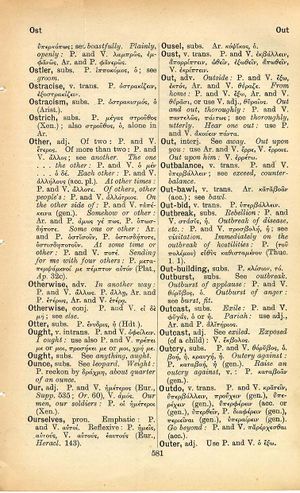outcast: Difference between revisions
From LSJ
πρῶτον μὲν οὖν ὄστρεια παρὰ Νηρεῖ τινι ἰδὼν γέροντι φυκί ἠμφιεσμένα ἔλαβον ἐχίνους τ' ἐστὶ γὰρ προοίμιον δείπνου χαριέντως ταῦτα πεπρυτανευμένου → So first I spotted oysters wrapped in seaweed at the shop of some old Nereus, and sea urchins, which I bought; these were the appetizers for a delightfully managed dinner
(CSV4) |
m (Woodhouse1 replacement) |
||
| Line 1: | Line 1: | ||
{{Woodhouse1 | {{Woodhouse1 | ||
|Text=[[File:woodhouse_581.jpg|thumb|link={{filepath:woodhouse_581.jpg}}]] | |Text=[[File:woodhouse_581.jpg|thumb|link={{filepath:woodhouse_581.jpg}}]] | ||
===substantive=== | |||
[[exile]]: [[prose|P.]] and [[verse|V.]] [[φυγάς]], ὁ or ἡ. | |||
[[pariah]]: use adj., [[Aristophanes|Ar.]] and [[prose|P.]] [[ἀλιτήριος]]. | |||
===adjective=== | |||
See [[exiled]]. | See [[exiled]]. | ||
[[exposed]] (of a [[child]]): [[verse|V.]] [[ἔκβολος]]. | |||
}} | }} | ||

